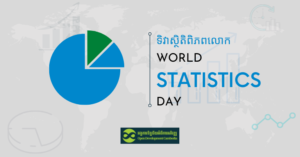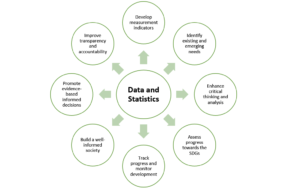អបអរសាទរទិវាស្ថិតិពិភពលោកឆ្នាំ ២០២០!
ភ្ជាប់ពិភពលោកជាមួយទិន្នន័យដែលយើងអាចទុកចិត្តបាន
ថ្ងៃទី២០ ខែតុលា ឆ្នាំ២០២០ គឺជាទិវាស្ថិតិពិភពលោកលើកទី៣ ជាថ្ងៃដែលប្រមូលផ្តុំសហគមន៍នៅជុំវិញពិភពលោកដើម្បីអបអរសាទរនិងរំលឹកឡើងវិញនូវសារៈសំខាន់នៃស្ថិតិ។តាមរយៈសេចក្តីសំរេចលេខ ៦៩/២៨២ របស់ខ្លួន មហាសន្និបាតអង្គការសហប្រជាជាតិ (អ។ ស។ ប) បានបង្កើតការប្រារព្ធទិវាស្ថិតិពិភពលោក រៀងរាល់៥ឆ្នាំម្តង ដែលការប្រារព្ធចុងក្រោយបង្អស់គឺនៅឆ្នាំ២០១៥ ក្រោមពាក្យស្លោក “ទិន្នន័យកាន់តែប្រសើរ ជីវិតកាន់តែប្រសើរ” ។ ប្រធានបទឆ្នាំ ២០២០ ភ្ជាប់ពិភពលោកជាមួយទិន្នន័យដែលយើងអាចជឿទុកចិត្តបាន “ឆ្លុះបញ្ចាំងពីសារៈសំខាន់នៃការទុកចិត្ត ទិន្នន័យជាផ្លូវការ ភាពច្នៃប្រឌិត និងភាពល្អប្រសើរសាធារណៈនៅក្នុងប្រព័ន្ធស្ថិតិជាតិ ”។
ក្នុងឱកាសទិវាស្ថិតិពិភពលោក អង្គការទិន្នន័យអំពីការអភិវឌ្ឍ (អូឌីស៊ី) លើកទឹកចិត្តអ្នកវិទ្យាសាស្ត្រទិន្នន័យ អង្គការសង្គមស៊ីវិល មន្ត្រីរដ្ឋាភិបាល និងក្រុមហ៊ុនឯកជនឱ្យឆ្លៀតយកឱកាសនេះដើម្បីលើកកម្ពស់ការយល់ដឹងអំពីតួនាទីទិន្នន័យនៅក្នុងជីវិតរបស់យើង សារៈសំខាន់នៃភាពត្រឹមត្រូវ និងការវិភាគពេលវេលា និងតម្រូវការចែករំលែកទិន្នន័យបន្ថែមនៅកម្ពុជា។ យើងក៏លើកទឹកចិត្តអ្នកឱ្យចែករំលែកគំនិតរបស់អ្នកតាមរយៈ#StatsDay2020។
ទិន្នន័យនិងស្ថិតិសម្រាប់ការអភិវឌ្ឍន៍
ស្ថិតិដែលអាចទុកចិត្តបានសំរាប់សាធារណៈផ្តល់អត្ថប្រយោជន៍ដល់យើងម្នាក់ៗ។ ប្រព័ន្ធស្ថិតិមានស្ថេរភាព គួរឱ្យទុកចិត្ត មានមុខងារដើរតួនាទីយ៉ាងសំខាន់ក្នុងការធានាផ្លូវអភិវឌ្ឍន៍ប្រកបដោយចីរភាព និងជាគន្លឹះសម្រាប់ការសម្រេចចិត្តនៅកម្រិតបុគ្គល។
ទិន្នន័យដែលមានគុណភាពខ្ពស់គឺជាកត្តាកំណត់ការបង្កើតសូចនាករដែលអាចទុកចិត្តបានហើយអាចវាស់វែងវឌ្ឍនភាពប្រកបដោយប្រសិទ្ធភាព និងតាមដានការរីកចម្រើន និងការអភិវឌ្ឍន៍។ តាមពិតសារៈសំខាន់នៃភាពគួរឱ្យទុកចិត្តនៃទិន្នន័យត្រូវបានបង្កប់នៅក្នុងនិមិត្តសញ្ញាផ្លូវការនៃទិវាស្ថិតិពិភពលោកឆ្នាំនេះ រូបរាងជារង្វង់តំណាងរាងពិភពលោកជាមួយសញ្ញាធីកដែលតំណាងឱ្យសុវត្ថិភាពដែលអាចទុកចិត្តបាន។ ដូចគ្នានេះដែរ ស្ថិតិផ្លូវការក៏ជាសូចនាករនៃកំរិតតម្លាភាព និងអភិបាលកិច្ចល្អនៅក្នុងប្រទេសមួយផងដែរ។ ប្រព័ន្ធស្ថិតិជាតិប្រកបដោយប្រសិទ្ធភាពគឺផលិត និងបោះពុម្ពផ្សាយទិន្នន័យពេញលេញជាប្រចាំ ដែលបង្កើនទំនុកចិត្តនិងភាពជឿជាក់របស់សាធារណជន។
ដូច្នេះ ទោះបីវាមើលទៅដូចជាមិនមានភស្តុតាងក៏ដោយ ស្ថិតិមានសារៈសំខាន់ខ្ពស់ចំពោះប្រជាពលរដ្ឋនៅក្នុងជីវិតប្រចាំថ្ងៃរបស់ពួកគេ។ ស្ថិតិជាឧបករណ៍សម្រាប់សាធារណជនដើម្បីរក្សារដ្ឋាភិបាល និងស្ថាប័នផ្សេងទៀតឱ្យមានទំនួលខុសត្រូវ។ ប្រព័ន្ធអេកូឡូស៊ីស្ថិតិមានភាពចាំបាច់ដើម្បីពង្រឹងការគិតពិចារណា និងសង្គមដែលប្រកបដោយការយល់ដឹងពីព័ត៌មាន ដែលកត្តានេះអាចប្រឆាំងនឹងការផ្សព្វផ្សាយព័ត៌មានមិនពិតនិងក្លែងក្លាយ ហើយនឹងបង្កើនការវិភាគទិន្នន័យសម្រាប់ការជជែកដេញដោលផ្អែកលើភ័ស្តុតាង និងការសម្រេចចិត្តទាំងក្នុងវិស័យសាធារណៈ និងឯកជន។
ស្របគ្នានឹងទិវាស្ថិតិពិភពលោកឆ្នាំនេះ អង្គការសហវប្រជាជាតិកំពុងរៀបចំវេទិកាទិន្នន័យពិភពលោកនៅថ្ងៃទី១៩-២១ ខែតុលា។ អ្នករាល់គ្នាដែលចាប់អារម្មណ៍ចង់រៀនពីទិន្នន័យឈានមុខគេ និងអ្នកជំនាញស្ថិតិអាចចុះឈ្មោះចូលក្នុងវេទិកាជាក់ស្តែងតាមរយៈតំណភ្ជាប់នេះទៅកាន់ផ្នែកស្ថិតិរបស់អង្គការសហប្រជាជាតិ។
ស្ថិតិនៅកម្ពុជា
ប្រព័ន្ធស្ថិតិជាតិរបស់កម្ពុជាដឹកនាំដោយវិទ្យាស្ថានវិទ្យាស្ថានជាតិស្ថិតិជាតិស្ថិតិ (NIS) និងរួមបញ្ចូលទាំងក្រសួងស្ថាប័នចំនួន២៧ និងស្ថាប័នរដ្ឋាភិបាលនិងធនាគារជាតិនៃកម្ពុជា។ស្ថាប័នក្រសួង និងរដ្ឋាភិបាលនីមួយៗត្រូវរាប់បញ្ចូលអង្គភាពដែលទទួលខុសត្រូវចាត់ចែងការរៀបចំស្ថិតិ។ សូចនាករដែលមានលក្ខណៈស្តង់ដារត្រូវបានប្រើប្រាស់ដោយផ្នែកផ្សេងៗគ្នា ដើម្បីវាយតម្លៃពីស្ថានភាពប្រជាសាស្ត្រ និងសេដ្ឋកិច្ចសង្គមរបស់ប្រជាពលរដ្ឋ ក៏ដូចជាដើម្បីវាយតម្លៃការជឿនលឿន និងចន្លោះប្រហោងឆ្ពោះទៅរកផែនការ និងយុទ្ធសាស្ត្រជាតិរបស់រដ្ឋាភិបាល។ ក្រៅពីនេះ របាយការណ៏ការត្រួតពិនិត្យជាតិដោយស្ម័គ្រចិត្តដែលបានបោះពុម្ពផ្សាយក្នុងឆ្នាំ២០១៩ ដែលដឹកនាំដោយក្រសួងផែនការ បានពិនិត្យឡើងវិញនូវវឌ្ឍនភាពនៅក្នុងក្របខ័ណ្ឌនៃរបៀបវារៈឆ្នាំ ២០៣០ និងគោលដៅអភិវឌ្ឍន៍ប្រកបដោយចីរភាពនៅកម្ពុជា។
ប្រភពសំខាន់នៃទិន្នន័យស្ថិតិផ្លូវការគឺគេហទំព័រផ្លូវការបស់វិទ្យាស្ថានជាតិស្ថិតិដែលទិន្នន័យ និងរបាយការណ៍សំខាន់ៗត្រូវបានផ្សព្វផ្សាយតាមអ៊ីនធឺណិត។ វិទ្យាស្ថានជាតិស្ថិតិធ្វើការស្ទង់មតិសេដ្ឋកិច្ច សង្គមកិច្ច ជំរឿនកំនើនប្រជាជន និងជំរឿនសេដ្ឋកិច្ចតាមកាលកំណត់ក៏ដូចជាការស្ទង់មតិប្រជាសាស្ត្រ និងសុខភាព។ ទោះយ៉ាងណា ទិន្នន័យដែលផលិត និងបោះពុម្ពផ្សាយនៅកម្ពុជាមិនតែងតែត្រូវបានធ្វើបច្ចុប្បន្នភាពពេញលេញនិងមិនច្បាស់នោះទេ។ភាពអាចរកបាននៃព័ត៌មាននៅតែមានកម្រិតនៅតាមផ្នែកខ្លះ ហើយមិនត្រូវបានគេធ្វើឲ្យទៅជាទិន្នន័យឌីជីថលនោះទេ។ នៅក្នុងសេណារីយ៉ូបែបនេះ ការងាររបស់អូឌីស៊ីគឺជាគន្លឹះក្នុងការជួយសម្រួលដល់ការទទួលបានទិន្នន័យដែលងាយស្រួលយល់ ស្វែងរក និងប្រើប្រាស់ឡើងវិញសម្រាប់ការវិភាគបន្តទៀត។
ប្រទេសកម្ពុជាបានបោះជំហានយ៉ាងខ្លាំងក្នុងការបង្កើនបរិមាណនិងធ្វើអោយប្រសើរឡើងនូវគុណភាពនៃប្រព័ន្ធស្ថិតិរបស់ខ្លួនក្នុងប៉ុន្មានឆ្នាំចុងក្រោយនេះ។ នៅពេលដែលប្រព័ន្ធអេកូឡូស៊ីទិន្នន័យនៅតែបន្តពង្រីក វាមានសារៈសំខាន់ណាស់ក្នុងការធានាថាអ្នកប្រើប្រាស់ម្នាក់ៗត្រូវបានការពារ និងអាចប្រើប្រាស់ទិន្នន័យដែលមានស្រាប់។ ក្នុងទស្សនៈនេះ អូឌីស៊ីគាំទ្រគោលការណ៍របស់អង្គការ Mydata Asia ដែលអង្គការនេះផ្សំឡើងដោយសមាជិកចម្រុះដែលស្វែងរកចក្ខុវិស័យផ្តោតសំខាន់លើទិន្នន័យផ្ទាល់ខ្លួនដែលធានានូវលក្ខខណ្ឌនៃសង្គមឌីជីថលដែលមាននិរន្តរភាព និងភាពរីកចម្រើន។ គោលការណ៍ MyData គឺផ្អែកលើវិធីសាស្ត្រផ្តោតសំខាន់លើមនុស្ស ហើយរាប់បញ្ចូលការគ្រប់គ្រងរបស់អ្នកប្រើប្រាស់ទិន្នន័យផ្ទាល់ខ្លួន ភាពឯកជននៃទិន្នន័យ ការផ្តល់សិទ្ធិអំណាចបុគ្គល ភាពចល័ត និងអន្តរប្រតិបត្តិការនៃទិន្នន័យ និងតម្លាភាពនិងគណនេយ្យភាពរបស់អង្គការដែលកាន់កាប់ទិន្នន័យផ្ទាល់ខ្លួន។
ការពង្រឹងកិច្ចសហប្រតិបត្តិការអន្តរវិស័យបន្ថែម និងការចែករំលែកជំនាញនៅក្នុងប្រទេស ក៏ដូចជានៅទូទាំងតំបន់ នឹងមានសារៈសំខាន់ណាស់សម្រាប់ប្រទេសកម្ពុជាក្នុងប៉ុន្មានឆ្នាំខាងមុខនេះ ដើម្បីជំរុញហេដ្ឋារចនាសម្ព័ន្ធទិន្នន័យ ជំនាញបច្ចេកទេស និងស្ថិតិផ្អែកលើការវិភាគទិន្នន័យ និងការធ្វើសេចក្តីសម្រេចចិត្ត។



